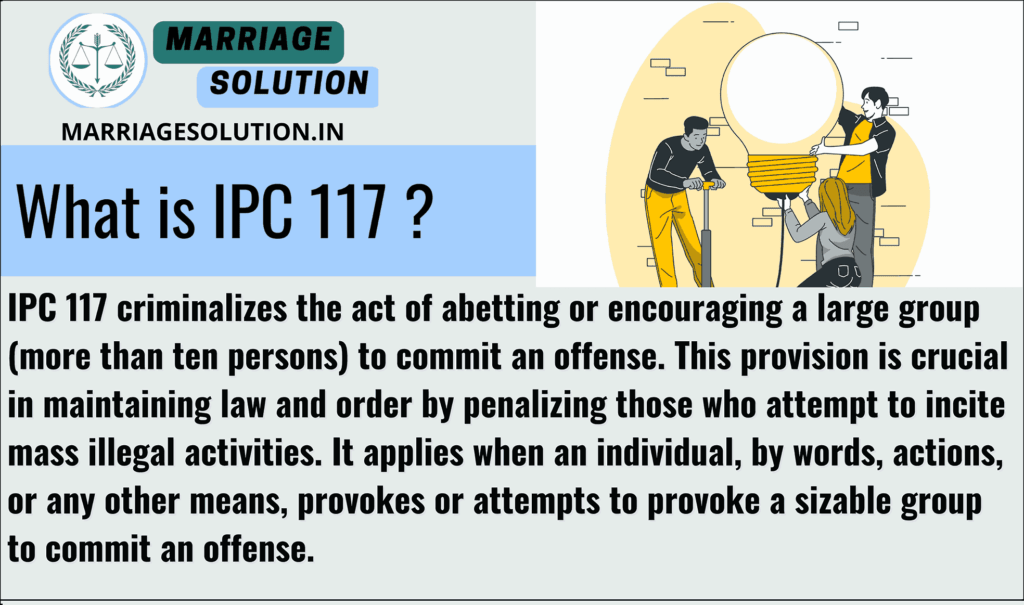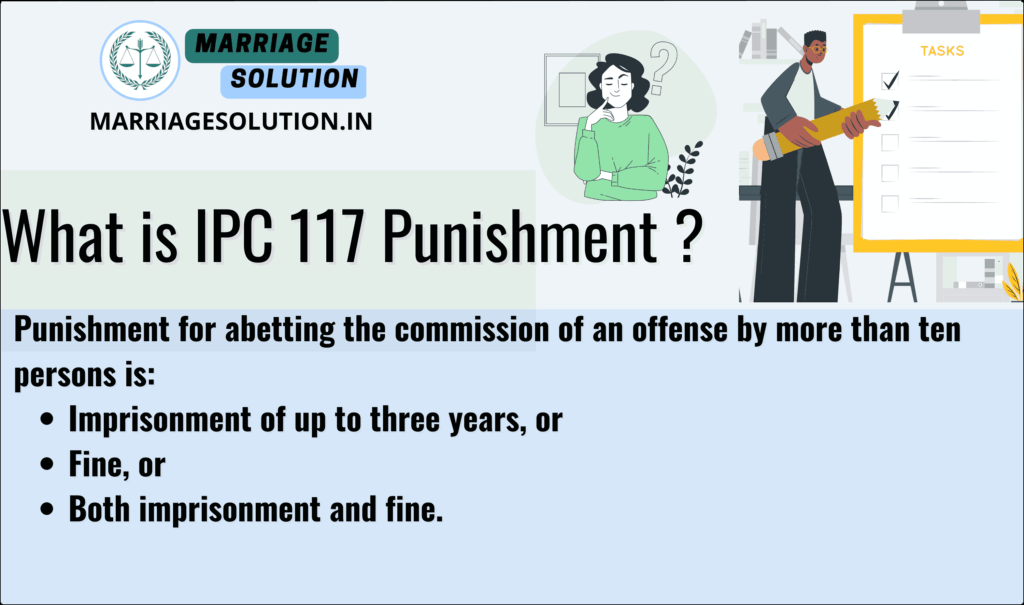Introduction of 117 IPC
Section 117 of the Indian Penal Code (IPC) addresses the offense of abetting the commission of offenses by the public or by more than ten persons. This section is designed to prevent the incitement of large groups to commit illegal acts, ensuring public order and safety. The provision underscores the seriousness of influencing a significant number of people towards criminal activities.
- Introduction of 117 IPC
- What is IPC Section 117 ?
- IPC Section 117 Overview
- Section 117 of IPC Punishment
- 117 IPC bailable or not ?
- Section 117 IPC case laws
- Section 117 IPC in short information
- 117 IPC FAQs
- If you need support with court proceedings or any other legal matters, don’t hesitate to reach out for assistance.
What is IPC Section 117 ?
IPC 117 criminalizes the act of abetting or encouraging a large group (more than ten persons) to commit an offense. This provision is crucial in maintaining law and order by penalizing those who attempt to incite mass illegal activities. It applies when an individual, by words, actions, or any other means, provokes or attempts to provoke a sizable group to commit an offense.

IPC Section 117 Overview
Detailed Explanation of IPC 117 in 6 Key Points
1. Scope of the Law
- Explanation: IPC 117 covers the abetment of any offense committed by a group of more than ten people.
- Detail: This broad scope ensures that individuals who incite large groups to commit crimes are held accountable, irrespective of the specific offense.
2. Preventive Nature
- Explanation: The law aims to prevent mass criminal activities.
- Detail: By penalizing the act of encouraging large groups to commit offenses, IPC 117 serves as a deterrent against organized crime and riots.
3. Mode of Abetment
- Explanation: Abetment can be through words, actions, or other means.
- Detail: This includes speeches, writings, gestures, or any form of communication that incites people to commit crimes.
4. Punishment Details
- Explanation: The section prescribes imprisonment, fine, or both.
- Detail: The maximum imprisonment term is three years, reflecting the seriousness of influencing large groups.
- Explanation: Generally, offenses under IPC 117 are bailable.
- Detail: Depending on the severity and context of the abetted offense, bail can be granted.
6. Legal Safeguard
- Explanation: Provides a legal mechanism to address potential mass crimes.
- Detail: By addressing the root (incitement), the law helps in preventing large-scale criminal activities and maintaining public order.
Section 117 of IPC Punishment
Punishment for abetting the commission of an offense by more than ten persons is:
- Imprisonment of up to three years, or
- Fine, or
- Both imprisonment and fine.

117 IPC bailable or not ?
Offenses under IPC 117 are generally bailable, depending on the nature and gravity of the offense being abetted.
Section 117 IPC case laws
Section 117 IPC Case Laws
Case Law 1: State of Maharashtra vs. Suresh Pandurang Darvakar
1. Facts: Suresh Pandurang Darvakar was accused of inciting a mob to commit arson during a protest.
2. Legal Issue: Whether Suresh’s actions amounted to abetment under Section 117.
3. Judgment: The court held Suresh guilty, emphasizing the influence his speech had on the mob’s actions.
4. Significance: Highlights the role of leaders in protests and the legal repercussions of their incitements.
5. Legal Principle: Reinforced that incitement to a group exceeding ten people qualifies as an offense under IPC 117.
6. Outcome: Suresh was sentenced to two years of imprisonment.
7. Implications: Serves as a warning to political and social leaders about the legal consequences of their words.
8. Deterrence: The case acts as a deterrent against mass incitement during volatile situations.
Case Law 2: State of Uttar Pradesh vs. Ramesh Kumar
1. Facts: Ramesh Kumar was accused of encouraging a group of workers to vandalize company property during a strike.
2. Legal Issue: Determining the applicability of IPC 117 in labor disputes.
3. Judgment: The court found Ramesh guilty, emphasizing the planned nature of the incitement.
4. Significance: Shows that even in labor disputes, incitement to commit crimes is punishable.
5. Legal Principle: Established that IPC 117 applies irrespective of the context if the group size and incitement criteria are met.
6. Outcome: Ramesh received a three-year prison sentence.
7. Implications: Encourages peaceful negotiation in labor disputes.
8. Deterrence: Deters union leaders from inciting violence.
Case Law 3: Delhi Administration vs. Sanjay Sharma
1. Facts: Sanjay Sharma was charged with instigating a mob to loot shops during a communal riot.
2. Legal Issue: Whether Sanjay’s speech could be directly linked to the mob’s actions.
3. Judgment: Sanjay was convicted under IPC 117 for incitement.
4. Significance: Stressed the importance of responsible speech during communal tensions.
5. Legal Principle: Affirmed that verbal incitement in volatile environments attracts liability.
6. Outcome: Sanjay was sentenced to two and a half years in prison.
7. Implications: Highlights the legal responsibilities of community leaders.
8. Deterrence: Acts as a preventive measure against communal violence.
Case Law 4: State of Karnataka vs. Nagesh
1. Facts: Nagesh was accused of encouraging villagers to burn government property during a land dispute.
2. Legal Issue: Whether Nagesh’s encouragement constituted abetment under IPC 117.
3. Judgment: The court found Nagesh guilty.
4. Significance: Emphasizes the application of IPC 117 in rural disputes.
5. Legal Principle: Reinforced the wide applicability of IPC 117.
6. Outcome: Nagesh was sentenced to one year in prison.
7. Implications: Warns individuals against inciting violence over property disputes.
8. Deterrence: Acts as a legal barrier to rural unrest.
Case Law 5: State of Tamil Nadu vs. Anand
1. Facts: Anand was accused of provoking a crowd to attack police officers during a protest.
2. Legal Issue: Applicability of IPC 117 in instances of direct confrontation with law enforcement.
3. Judgment: Anand was convicted.
4. Significance: Demonstrates the use of IPC 117 to protect law enforcement.
5. Legal Principle: Incitement against police forces falls under IPC 117.
6. Outcome: Anand received a three-year sentence.
7. Implications: Protects police officers by deterring mob violence.
8. Deterrence: Discourages confrontations with law enforcement.
Case Law 6: State of Bihar vs. Sunil Kumar
1. Facts: Sunil Kumar was accused of encouraging students to vandalize school property during a strike.
2. Legal Issue: Whether student-led incitement falls under IPC 117.
3. Judgment: The court held Sunil Kumar guilty.
4. Significance: Applies IPC 117 in educational settings.
5. Legal Principle: Reinforced that all groups, including students, are subject to IPC 117.
6. Outcome: Sunil received a two-year sentence.
7. Implications: Promotes peaceful protests in educational institutions.
8. Deterrence: Deters student leaders from inciting violence.
Case Law 7: State of Gujarat vs. Harish Patel
1. Facts: Harish Patel was accused of inciting a mob to destroy public transportation during a fare hike protest.
2. Legal Issue: Applicability of IPC 117 in economic protests.
3. Judgment: Harish was convicted under IPC 117.
4. Significance: Shows the applicability of IPC 117 in economic protests.
5. Legal Principle: Incitement leading to destruction of public property is punishable under IPC 117.
6. Outcome: Harish received a three-year sentence.
7. Implications: Encourages peaceful economic protests.
8. Deterrence: Discourages violence during economic disputes.
Case Law 8: State of West Bengal vs. Ravi Shankar
1. Facts: Ravi Shankar was accused of inciting a mob to attack a religious procession.
2. Legal Issue: Whether incitement in religious contexts falls under IPC 117.
3. Judgment: The court found Ravi Shankar guilty.
4. Significance: Applies IPC 117 to protect religious harmony.
5. Legal Principle: Incitement in religious contexts is punishable.
6. Outcome: Ravi received a two-year sentence.
7. Implications: Promotes religious harmony.
8. Deterrence: Deters religious violence.
Case Law 9: State of Rajasthan vs. Deepak Mehta
1. Facts: Deepak Mehta was accused of inciting farmers to burn crop insurance offices during a protest.
2. Legal Issue: Whether IPC 117 applies in agrarian disputes.
3. Judgment: Deepak was convicted.
4. Significance: Shows the use of IPC 117 in agrarian contexts.
5. Legal Principle: Incitement in agrarian protests is punishable under IPC 117.
6. Outcome: Deepak received a three-year sentence.
7. Implications: Encourages peaceful agrarian protests.
8. Deterrence: Deters violence in agrarian disputes.
Case Law 10: State of Punjab vs. Amarjit Singh
1. Facts: Amarjit Singh was accused of inciting a group to attack a rival political rally.
2. Legal Issue: Applicability of IPC 117 in political rivalries.
3. Judgment: Amarjit was convicted under IPC 117.
4. Significance: Shows the use of IPC 117 in political contexts.
5. Legal Principle: Political incitement leading to violence is punishable under IPC 117.
6. Outcome: Amarjit received a three-year sentence.
7. Implications: Promotes peaceful political activities.
8. Deterrence: Deters violence in political rivalries.
Section 117 IPC in short information
| Offense | Definition | Punishment | Bailable or Not |
|---|---|---|---|
| Abetment of an offense by more than ten persons | Encouraging or aiding a group of more than ten people to commit a crime | Up to 3 years imprisonment, or fine, or both | Generally bailable |
117 IPC FAQs
What does IPC 117 address?
It addresses the abetment of offenses by more than ten persons.
What is the punishment under IPC 117?
Punishment can include up to three years of imprisonment, a fine, or both.
Is IPC 117 bailable?
Generally, yes, depending on the specific circumstances and severity of the abetted offense.
What is the purpose of IPC 117?
The purpose is to prevent the incitement of large groups to commit illegal acts, maintaining public order.
If you need support with court proceedings or any other legal matters, don’t hesitate to reach out for assistance.
Court or any other marriage-related issues, our https://marriagesolution.in/lawyer-help-1/ website may prove helpful. By completing our enquiry form and submitting it online, we can provide customized guidance to navigate through the process effectively. Don’t hesitate to contact us for personalized solutions; we are here to assist you whenever necessary!
